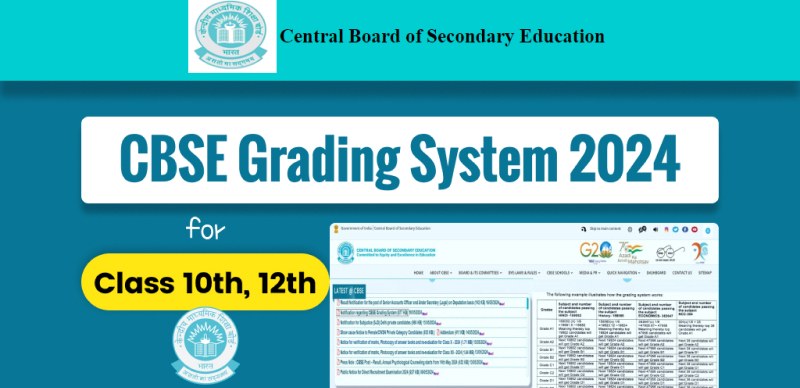CBSE Grading System 2024 : CBSE Grading System Explained for Class 10th, 12th - Details Here

SHARING IS CARING
If our Website helped you a little, then kindly spread our voice using Social Networks. Spread our word to your readers, friends, teachers, students & all those close ones who deserve to know what you know now.
The Central Board of Secondary Education (CBSE) has introduced a new grading system called 'Relative Grading' for Class 10 and 12 students. This system awards grades based on students' performance relative to their peers, rather than on fixed cut-off marks. The CBSE announced the Class 10 and 12 results on May 13, 2024. Students can access their official mark sheets through their schools or DigiLocker.
What is Relative Grading?
In the Relative Grading system, grades are assigned based on a percentile system. Unlike traditional methods that use predetermined cut-off marks, Relative Grading compares students' performance within their group. The number of students passing a subject determines the grade distribution, meaning grades can vary between subjects.
👉 Read Also - How CBSE’s New Exam Pattern Will Impact Class 11 and 12 Students
Key Points About CBSE Relative Grading
- Percentile System: Grades depend on how students perform relative to others in the same subject.
- Variable Grades: Two students with the same marks can receive different grades if the distribution of scores in their subject group differs.
- Grade Assignment: Grades are based on the number of students passing the subject and their relative scores.
CBSE Toppers and Merit Certificates
CBSE does not officially announce toppers or release a merit list. However, merit certificates are awarded to students in the top 0.1% of each subject, provided that at least 500 students have taken that subject.
How Grades are Determined
- Adjusting for Ties: Minor adjustments are made to account for ties, ensuring fairness.
- Tie Cases: Students with the same score receive the same grade.
- Large Groups: Relative grading is applied to subjects with more than 500 passing students.
- Small Groups: For subjects with fewer than 500 passing students, grades are based on patterns from similar subjects.
For example, if 10,000 students pass Mathematics, the top 1/6th (approximately 1,666 students) will receive an A1 grade. This ranking is based on the students' relative performance, not their exact percentage scores.
-
👉 CBSE Class 12 Study Materials
| CBSE Class 12 Syllabus 2024-25 | CBSE Class 12 Previous Year Papers |
| NCERT Books For Class 12 Books | NCERT Class 12 Solutions |
| CBSE Class 12 Full Study Material | CBSE Class 12 Sample Paper 2023-24 |
-
👉 CBSE Class 10 Study Material
| CBSE Class 10 Syllabus 2024-25 | NCERT Solutions For Class 10 |
| CBSE Class 10 Previous Year Question Papers | CBSE Class 10 Books |
| CBSE Class 10 Full Study Material | CBSE Class 10 Sample Paper |







 Profile
Profile Signout
Signout












 Quiz
Quiz
 Get latest Exam Updates
Get latest Exam Updates 










